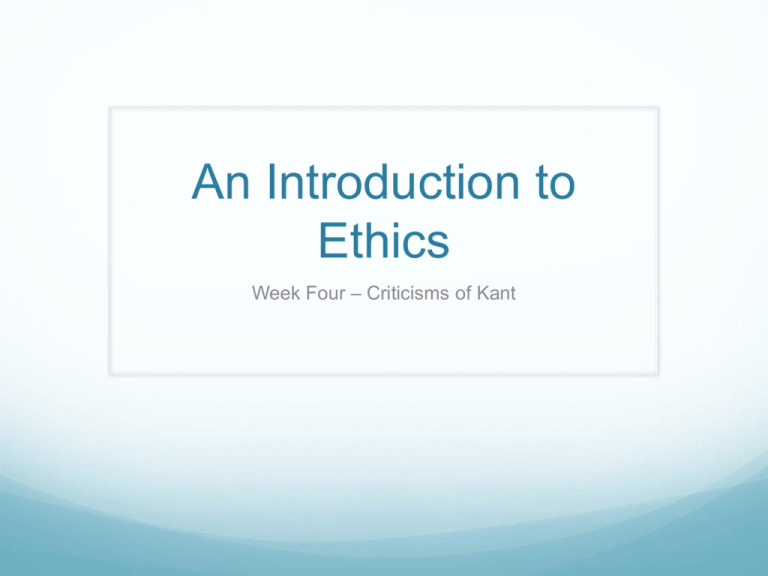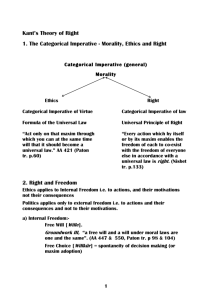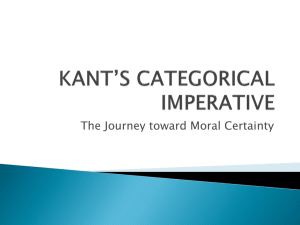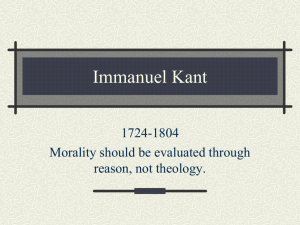File - Will Sharkey
advertisement

An Introduction to Ethics Week Four – Criticisms of Kant Kant Quick recap Kant Quick recap The Good Will Motive of Duty Categorical Imperative Absolute Value of Humanity Autonomy Kant Autonomy ‘Slave to desire’? ‘Reason is the slave of the passions’ (Hume) Distinction between first and second order desires Kant Positive Vs. Negative Liberty (Isaiah Berlin) Negative Liberty: What is the area within which the subject — a person or group of persons — is or should be left to do or be what he is able to do or be, without interference by other persons. I am free if nobody hinders me in getting what I want. Kant Positive Vs. Negative Liberty (Isaiah Berlin) Positive Liberty The ‘positive’ sense of the word ‘liberty’ derives from the wish on the part of the individual to be his own master. I wish my life and decisions to depend on myself, not on external forces of whatever kind. […] I wish, above all, to be conscious of myself as a thinking, willing, active being, bearing responsibility for my choices and able to explain them by references to my own ideas and purposes. I feel free to the degree that I belive this to be true, and enslaved to the degree that I am made to reaize that it is not. Kant Positive Liberty Who is the master of ‘me’? Who controls my future? Self-determination. Attractive View? free? Should we want to be ‘positively’ Kant The Paradox of Positive Liberty Drug Addict example (the drug addict who wants to quit). First order desire for some heroine Second order desire to not want to desire the heroin. Kant Self control – I decide that I do not want to take heroin anymore and flush my remaining supply down the toilet. We are free because we are choosing which desires to satisfy. Paternalism – In virtue of being somewhat weak-willed, my endeavour to control my habit is obtained with, unfortunately, limited success. I ask a friend/parent (or whoever) to stop me from going out and scoring some heroin. I ask you to exercise some control over me, and I do so in my own interests (like a child who is forced to take some beneficial, but unpleasant, medicine). In ‘liberating me’ from my worst self and freeing me from temptation, my freedom is promoted. Kant Social Control – Realizing that the threat of social constraints (e.g. punishments) is a good way to keep me on the straight and narrow path to sobriety, I join ‘drug-addicts anonymous’. I place myself under the authority of the ‘group’ to force me to be free. I voluntarily submit to the higher power of a state (or quasi state). (think of AA, churches, reading groups, weight watchers, Facebook…) Kant Totalitarian State (servitude) – I accept that my ability to reason in any situation is hampered by my inadequacy as a human being – I am weak and, therefore, often unable to see what the right thing to do is. The state can step in and take control of my entire life – promising to always make me act according to my own interests and thus morally improving me as an agent. Kant Berlin’s missing link? Kant Berlin’s missing link? Anarchy? Citizen becomes improved to the degree that she/he ‘intuits’ (learns and feels) the correct way to act. No longer needs the state, or any state. Does this help? Is this desirable? Kant Advocates the ‘miserable sinner’? The most moral agent is one who always acts from duty – never from inclination. Imagine someone who desires nothing but atrocious things but never acts on these desires, instead only ever acting in accordance with duty. Is this the most moral agent? Perhaps the most miserable too… Kant Advocates the ‘miserable sinner’? The most moral agent is one who always acts from duty – never from inclination. Imagine someone who desires nothing but atrocious things but never acts on these desires, instead only ever acting in accordance with duty. Is this the most moral agent? Perhaps the most miserable too… Mixed motivation? I want to do x, duty tells me to do x, so I do x from duty, gladly? Kant The axe-wielding maniac… Kant The problem of freedom… Laws of nature, laws of thought? (determinism) ‘Ought implies can’ (assumes free will) Kant’s answer – we cannot help but think we are free, therefore we cannot help but think we are bound by the Categorical Imperative. Transcendental Idealism and the possibility of freedom… Satisfying? Kant Who places you under an obligation? Kant Who places you under an obligation? You place yourself under an obligation (you are both subject and author of the moral law). Problems… Kant Anscombe (again): “Kant introduces the idea of ‘legislating for oneself’, which is as absurd as if in these days, when majority votes command great respect, one were to call each reflective decision a man made a vote resulting in a majority, which as a matter of proportion is overwhelming, for it is always 1- 0. The concept of the legislation requires superior power in the legislator.” If you can place yourself under an obligation – you can take yourself out again. Source of obligation cannot be ‘you’. Kant Anscombe leaves us with a dilemma – either we accept a ‘divine command’ theory of obligation (God, not I, is the source of obligation), or we revert to Aristotle (who, according to Anscombe, does away with talk of ‘obligation’ (in the moral sense)). Anscombe’s answer: Kant Anscombe leaves us with a dilemma – either we accept a ‘divine command’ theory of obligation (God, not I, is the source of obligation), or we revert to Aristotle (who, according to Anscombe, does away with talk of ‘obligation’ (in the moral sense)). Anscombe’s answer: Aristotle!








